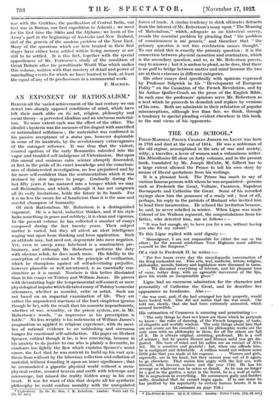AN EXPONENT OF RATIONALISM.*
13EIIIND all the varied achievement of the last century we can detect two sharply opposed conditions of mind, which have left their mark alike on its art, religion, philosophy and social theory—a perverted idealism and an unctuous material- ism. To some extent each was the effect of the other. The idealist's hysteria was the measure of his disgust with sanctified or nationalized selfishness ; the materialist was confirmed in his passive acceptance of a status quo, however deplorable in some of its incidents, by the revolutionary extravagances of the outraged reformer. It was thus that the violent, assured egotism of the early Romantics subsided into the vague and troubled self-indulgence of Victorianism. But upon this unreal and ominous calm science abruptly descended, at first in the pride of its exact knowledge and the conscious- ness of disinterested investigation, no less prejudiced and by far more self-confident than the sentimentalism which it was destined by slow degrees to purge. Gradually during the last fifty years it has matured into a temper which we may call Rationalism, and which, although it has not outgrown all its early limitations, holds the future in its hands. For it is no less the sworn foe of fanaticism than it is the sane and careful champion of humanity.
Of such Rationalism Mr. Robertson is a distinguished exponent. He is a lucid, inductive thinker, and if his style lacks something in grace and subtlety, it is clean and vigorous. In the present volume he has collected a number of essays composed during the last twenty years. Their subject matter is varied, but they all attest an alert intelligence waging war upon loose thinking and loose application. Such an attitude may, but need not, degenerate into mere negation. Yet, even to sweep away falsehood is a constructive pre- liminary, and although Mr. Robertson performs the duty with obvious relish, he does much more. His fidelity to the conception of evolution and to the principle of verification, which he champions against all self-advertising prejudice, however plausible or well intentioned, is as essentially con- structive as it is moral. Nowhere is this better illustrated than in his essays on Tolstoy and William James. He proves with devastating logic the temperamental self-conceit or mere physiological impulse which dictated many of Tolstoy's oracular utterances, whether as moralist, critic or artist. Such are not based on an impartial examination of life. They are rather the unpondered reactions of the hurt simpleton (genius though he be), with the result that his concrete impeachments, whether of war, sexuality, or the prison system, are, in Mr. Robertson's words, "as impressive as his prescription is futile." No less weighty is his indictment of William James's pragmatism as applied to religious experience, with its sacri- fice of rational evidence to an unblushing and strenuous hunger for emotional self-satisfaction. His paper on Herbert Spencer, critical though it be, is less convincing, because in his anxiety to do justice to one who is plainly a favourite, he condones too lightly the flaw which explains Spencer's worst errors, the fact that he was content to build up his vast syn- thesis from without by the laborious collection and collation of material, without founding it upon an inner significance ; that he accumulated a gigantic physical world without a meta- physical centre, scoured heaven and earth with telescope and microscope, but missed the reality hidden away in his own heart. It was for want of this that despite all his synthetic philosophy he could confuse morality with the unregulated
• Explorations. By the Rt. lion. J. hl. Robertson. London : Watts and Co. [Ti. Gti. net.]
forces of trade. A similar tendency to shirk ultimates detracts from the interest of Mr. Robertson's essay upon" The Meaning of Materialism," which, adequate as an historical survey, avoids the essential problem by pleading that "the problem of consciousness is sui generis," and therefore that "the primary question is not how cerebration causes thought." To our mind this is exactly the primary question : it is the connection between physical causation and cerebration, which is the secondary question, and so, as Mr. Robertson proves, easy to answer ; but it is useless to plead, as he does, that there is no gulf to bridge between matter and mind because the two arc at their extremes in different categories.
His other essays deal specifically with opinions expressed by Professor Sidgwick in his "Development of European Polity" on the Causation of the French Revolution, and by Sir Arthur Quiller-Couch on the prose of the English Bible. In each case the professors' opinions serve Mr. Robertson as a text which he proceeds to demolish and replace by versions of his own. Both are admirable in their refutation of popular misconceptions, although less than fair, we think, through a tendency to special pleading evident elsewhere in this book, to the real views of his opponents.


























































 Previous page
Previous page